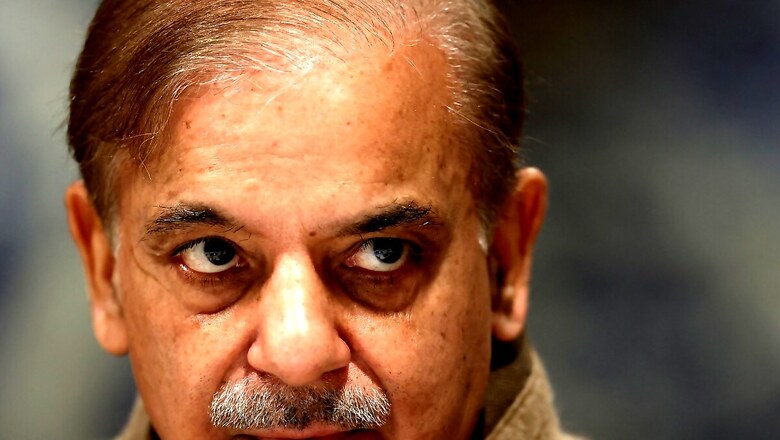
views
After months of political instability, Pakistan’s National Assembly finally elected PML-N leader Shehbaz Sharif as the new Prime Minister for the second time. The country, which has been witnessing economic and political crises, security challenges and diplomatic debacles, and most recently, the ballot fraud, has once again given the reins to Sharif, whose government comprising PML-N and Pakistan People’s Party (PPP), in popular opinion, does not have the mandate and legitimacy compared to Imran Khan’s Pakistan Tehreek-e-Insaf (PTI).
Let us look in detail the problems that the new government will have to face considering that it has no honeymoon period to even build a perception or raise people’s expectations.
Economic Crisis
The country’s skyrocketing inflation (around 25-30%) for the past many months has made the prices of essential items such as food, gas and electricity costly. However, there has been a slight downward trends in the inflation rate since January, 2024.
The average inflation for the first eight months of FY24 stood at 27.96%, compared to 26.19% during the same period last year. This exceeds the government’s projection of 21%. Additionally, the IMF has forecasted the average inflation for FY24 at 25.9%, representing a notable decline from the previous year’s 29.6%.
Meanwhile, Pakistan’s employment-to-population ratio last year fell below its pre-crisis trend line at 47.6%, while the number of unemployed persons is expected to reach 5.6 million — a surge of 1.5m since 2021, according to the ILO estimates.
The Sharif government would need $3 billion bailout from the International Monetary Fund (IMF) with the current programme expiring next month in order to keep Pakistan on the path of recovery.
The IMF has recommended the government to increase taxes, reduce tax slabs, and eliminate tax exemption on the contribution of private employers to pensioners, to yield additional revenues.
Terrorism and Internal Security Threats
The country has been grappling with terror attacks from Tehreek-e-Taliban Pakistan (TTP) from certain regions. The porous border with Afghanistan poses a huge threat to Pakistan, allowing militants to travel between both the countries with ease.
Also, the internal unrest in Balochistan and Khyber Pakhtunkhwa have kept the security forces on tenterhooks.
According to the annual security report prepared by the Islamabad-based Centre for Research and Security Studies (CRSS), at least 1,524 violence-related casualties and 1,463 injuries from 789 terror attacks and counter-terror operations were recorded in Pakistan in 2023.
Water and Food Scarcity
According to the Food and Agriculture Organization (FAO), around 18% of Pakistan’s population in undernourished, and the sector employs 38% of the country’s workforce, which faces another challenges.
Climate change causing erratic rains and flash floods have damaged the crops and livestock productivity.
According to UNICEF, the 2022 floods submerged one third of the country, affecting 33 million people, half of whom were children. The floods damaged most of the water systems in affected areas, forcing more than 5.4 million people to rely solely on contaminated water from ponds and wells.
Total estimated damage was $14.9 billion, and total economic losses was about $15.2 billion. Estimated needs for rehabilitation and reconstruction are at least USD 16.3 billion, as per a report by World Bank.
Housing, agriculture and livestock, and transport and communications sectors suffered the most significant damage, at $5.6 billion, $3.7 billion, and $3.3 billion, respectively. Sindh was the worst affected province with nearly 70% of total damages and losses, followed by Balochistan, Khyber Pakhtunkhwa, and Punjab, the report highlighted.
Pakistan Political Instability
The February 8 elections were marred by allegations of ballot fraud, but Imran Khan’s PTI and Independents secured a majority with 93 seats, while Sharif’s PML-N won 75 seats and PPP 54 seats, which open an opportunity for both the parties to form the government.
With reports suggesting that the Pakistan military was reluctant to make Nawaz Sharif the Prime Minister and wanted his daughter Maryam to become Punjab chief minister.
Several corruption cases involving top leaders Imran Khan and Nawaz Sharif also built the perception of the voters who began losing confidence in the political actors, the governance and policies.




















Comments
0 comment